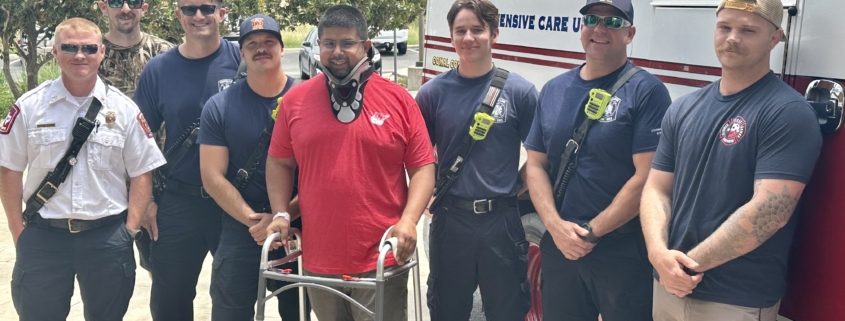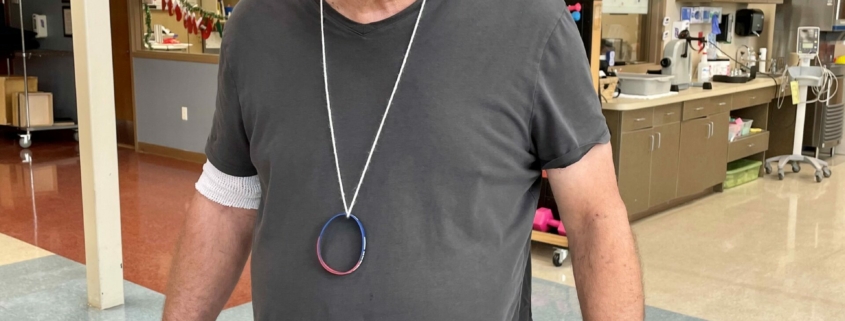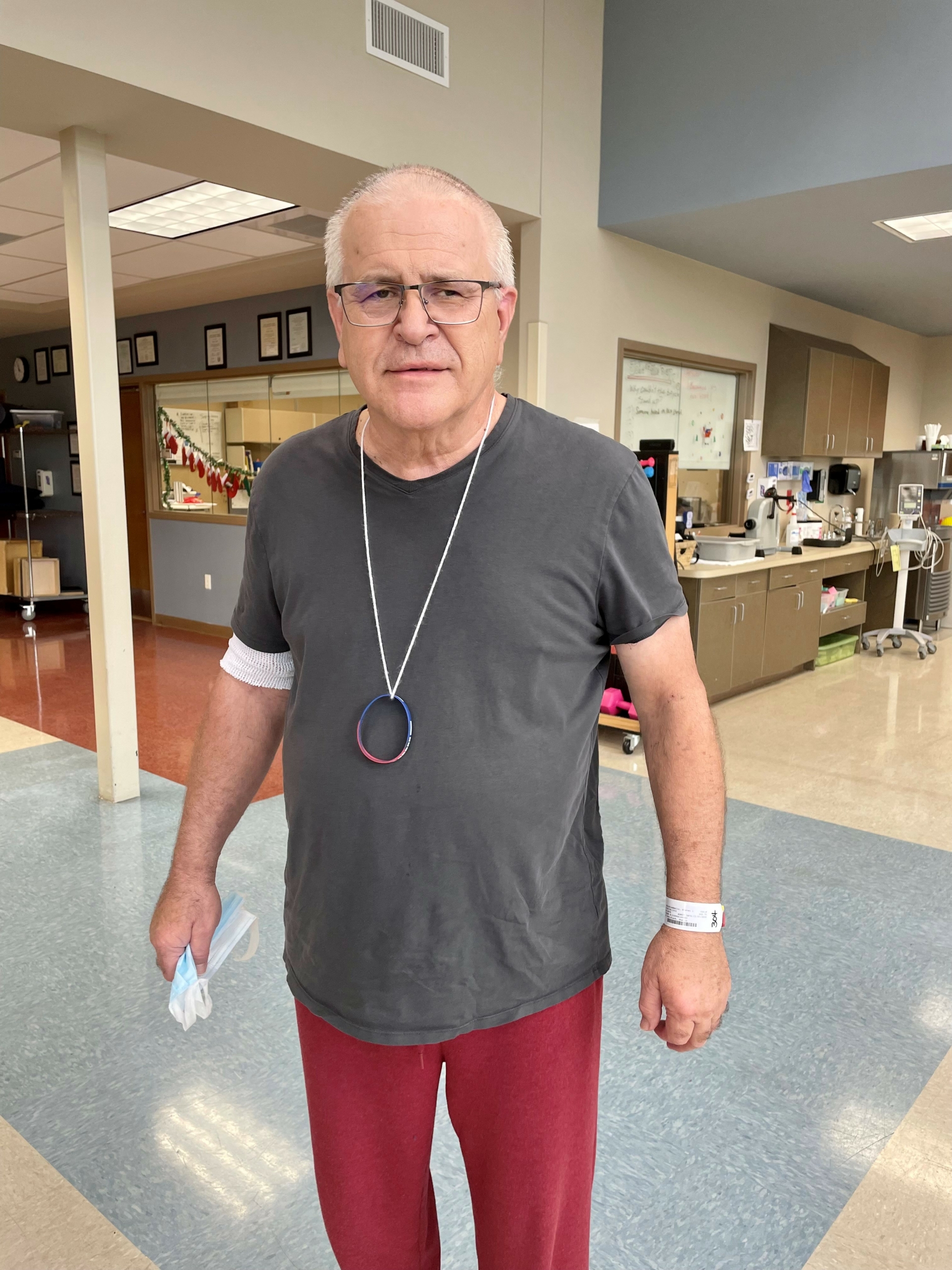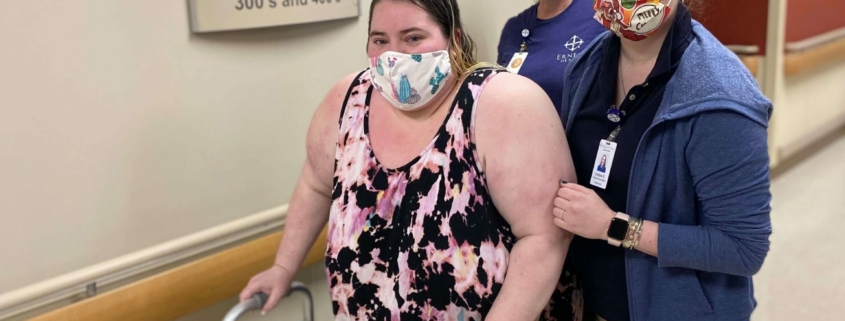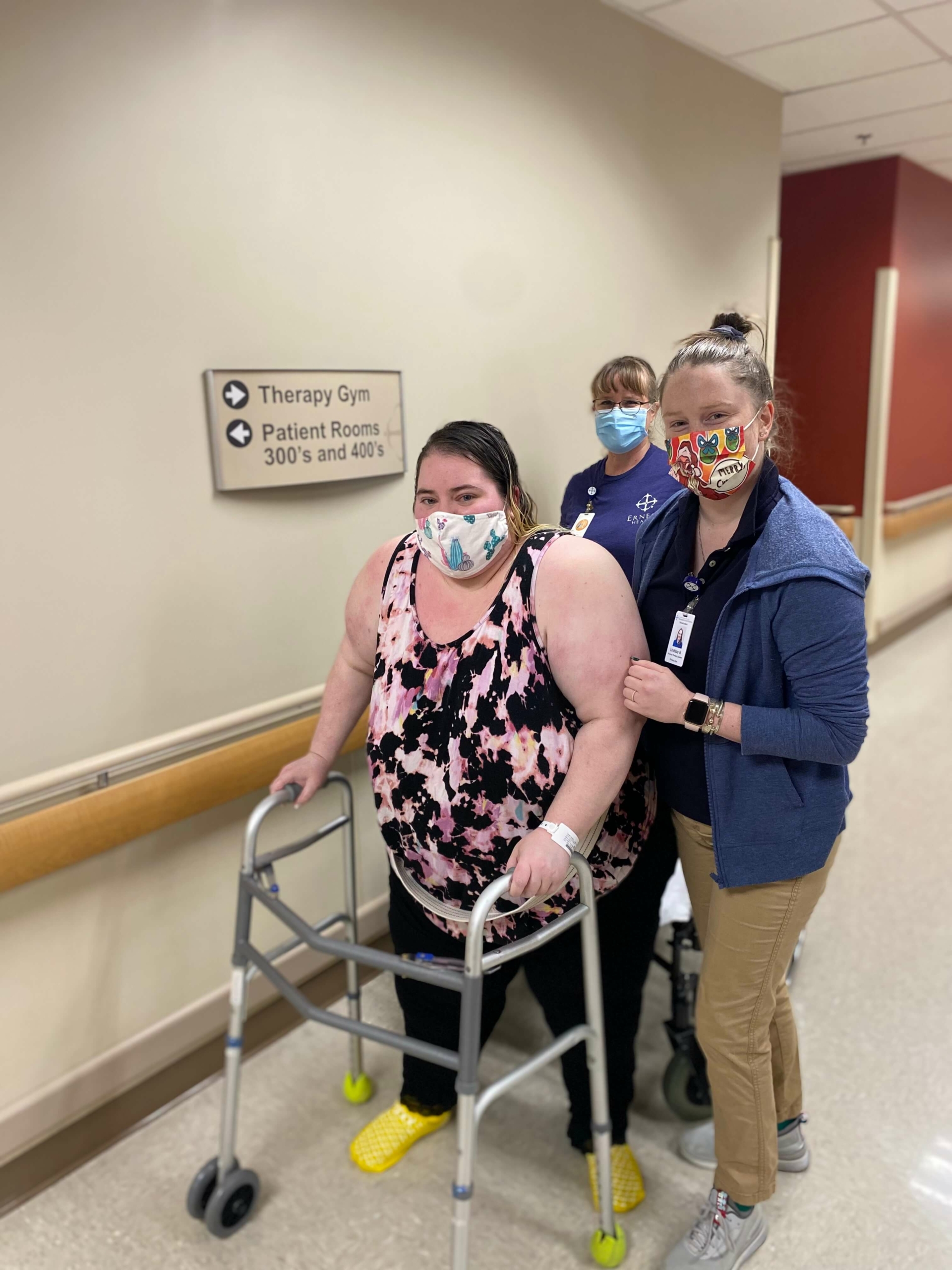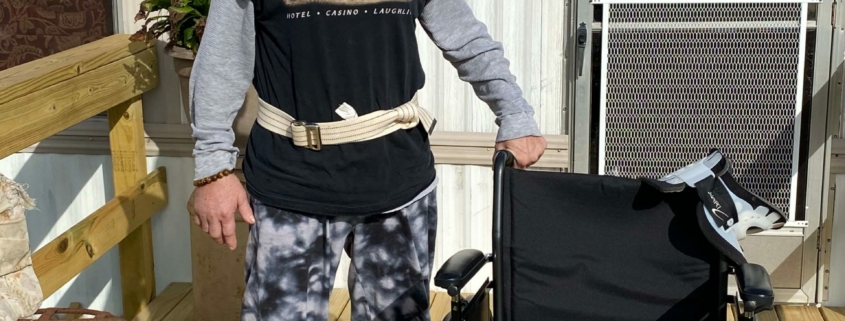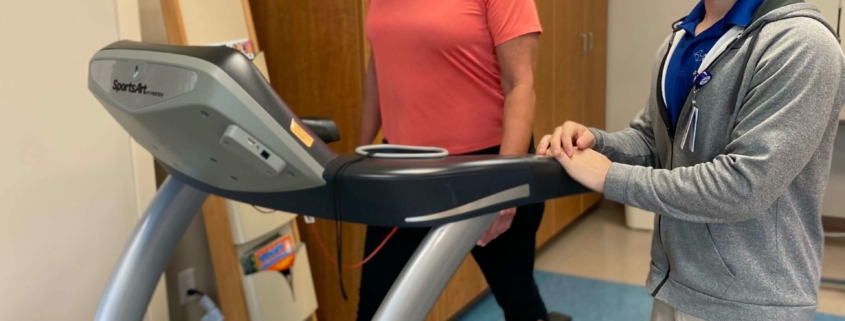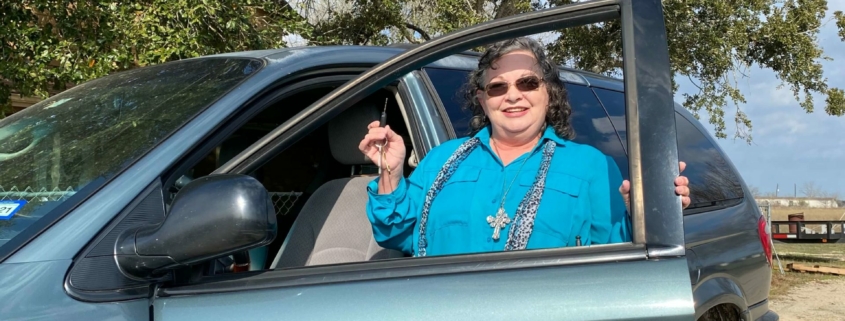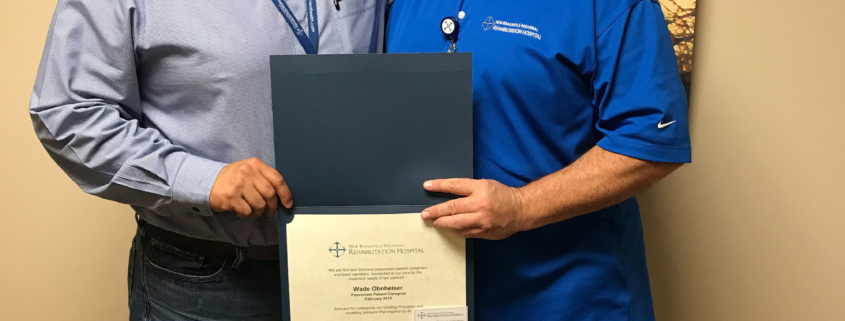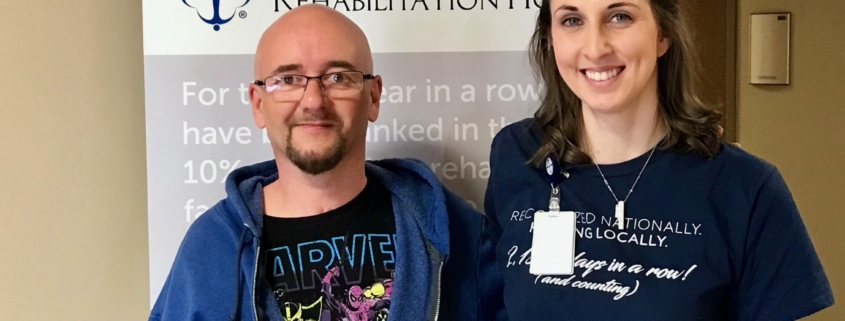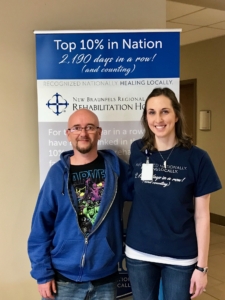In a testament to the indomitable spirit of resilience and determination, local firefighter, Jacob Garcia, emerged victorious from a challenging ordeal after successfully completing treatment at New Braunfels Regional Rehabilitation Hospital.
Steven Schledwitz of Blanco, TX, is an extremely active 70-year-old who spends a lot of his time upkeeping and trimming 400+ trees on his five acres of property. Steven has been married to his loving wife, Kristy, for 45 years. Together, they enjoy spending time with their two children and four grandchildren and state that one of their favorite pastimes is “just being together.”
Steven lives with Parkinson’s disease, and to mitigate some of his symptoms, he underwent brain surgery to place a deep brain stimulator (DBS). Steven went home after surgery, but Kristy noticed he started to decline shortly after discharge. He began to slur his speech, couldn’t recall words, and wasn’t able to walk without assistance. Kristy quickly reached out to New Braunfels Regional Rehabilitation Hospital (NBRRH) to inquire about admission for intensive neurological rehabilitation. Kristy had a family member who received therapy at NBRRH and said their recovery was phenomenal.
“My loved one ranted and raved about the care,” Kristy stated. “I knew Steven would be successful here too!”
Steven was admitted to NBRRH to begin his recovery process. However, his rehab team had concerns and recommended Steven follow up with his surgeon. An MRI revealed edema of the bilateral frontal leads, as well as a diffuse ring enhancement and an intracranial abscess. Steven underwent another procedure to remove his deep brain stimulator (DBS). During the surgery, Steven was found to have an infection. He began antibiotic treatment and returned to NBRRH for continued rehab. Since the removal of the device, he has made significant improvements.
Ashley Zuehl of Marion, Texas, is 34 years old. She spends a lot of her free time crafting, bowling, and caring for her six dogs. She works from home and has a passion for writing to her pen pals across the country.
In May, Ashley contracted COVID-19 and ended up in the hospital with worsening respiratory symptoms. She was intubated for 15 days and hospitalized for six weeks due to COVID-19, pneumonia, and respiratory failure. Upon discharge, she remained bed-bound due to a lack of equipment and the ability to regain her strength and endurance.
Patients who develop post-COVID-19 symptoms can suffer from extreme fatigue, lack of endurance, memory issues, and shortness of breath. In Ashley’s case, the right side of her body was severely affected. This prevented her from doing what she loved most—writing. She also suffered from extreme bilateral weakness and couldn’t bear weight on her lower extremities.
Ashley’s home health company recommended New Braunfels Regional Rehabilitation Hospital for intense therapy. Upon arrival at NBRRH, she said, “I want to be able to walk independently and get back to my normal life.” After not being able to walk for six months, her goal was to walk before her 34th birthday.
Aquatic therapy was extremely beneficial for Ashley’s post-COVID-19 symptoms. The water offered natural resistance, allowing her to strengthen her breathing muscles, as well as her limb and trunk muscles. The buoyancy of the water made movements easier while improving Ashley’s mobility and balance.
After intense therapy and over a month of hard work, Ashley met her goal of being able to walk before her birthday. She also improved her endurance, activity tolerance, and range of motion. These accomplishments helped her regain independence with her activities of daily living (ADLs). While celebrating her 34th birthday, Ashley also got to celebrate her newfound independence.
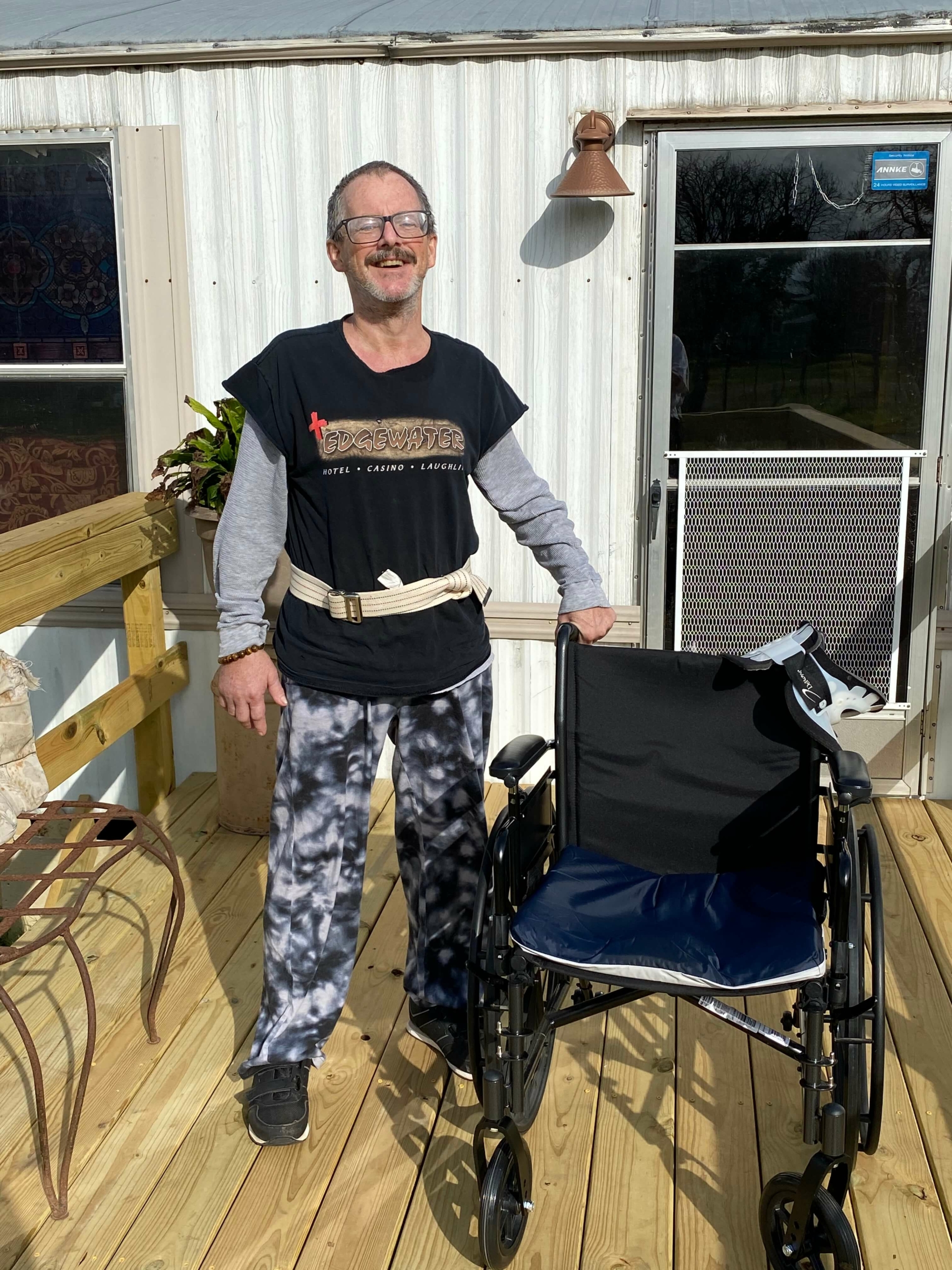
Kelly Shade loved looking after his ranch and spending time outdoors until he suffered a severe spinal cord injury.
Kelly Shade of Seguin, TX is an active 63-year-old who spends much of his free time enjoying the great outdoors. He has been married to his loving wife, Kathleen, for 37 years. They both enjoy spending time with their two children and three grandchildren. Kelly stays busy taking care of his ranch. He also enjoys landscaping, looking after his animals and plants, and riding his horses. His faith and ministry are very important to him as well.
One September day, Kelly’s life changed forever. He was thrown off his horse and landed on his head, breaking his neck in the process. Kelly immediately went to the hospital. There, they informed him that he suffered a spinal cord injury, which resulted in paralysis in his upper and lower limbs.
Kelly’s neurosurgeon compared his C2-C5 spinal cord injury to that of late actor Christopher Reeve. Seeing that he had some sensation left in his limbs, they quickly got him into surgery. Following surgery, Kelly needed rehabilitation to help him regain his strength and independence.
After researching various facilities, Kelly decided to transfer to New Braunfels Regional Rehabilitation Hospital. Recovering close to home was extremely important to him and his wife. They wanted their support system of friends and family nearby throughout Kelly’s healing journey.
“When I first got to NBRRH, I couldn’t walk or feed myself. The staff was so encouraging throughout my stay and taught me how to do these things again. The therapist would take me as far as I could go and gave me the reassurance and support I needed to succeed,” Kelly stated.
Because of his hard work, determination, and steadfast faith, Kelly made incredible progress throughout his 40-day stay at NBRRH. He regained the ability to walk and even developed movement in his left hand. His progress was phenomenal! Staff members joined in his excitement as he regained his abilities and became more independent. One of his therapists described him as “one of the most motivating and positive patients.”
Today, Kelly is back at the ranch with his wife and animals, but rehabilitation isn’t over yet. He is receiving home health therapy and continues working hard to make progress every day. His inspiring story is why we do what we do at NBRRH. We look forward to seeing where his adventures take him next.
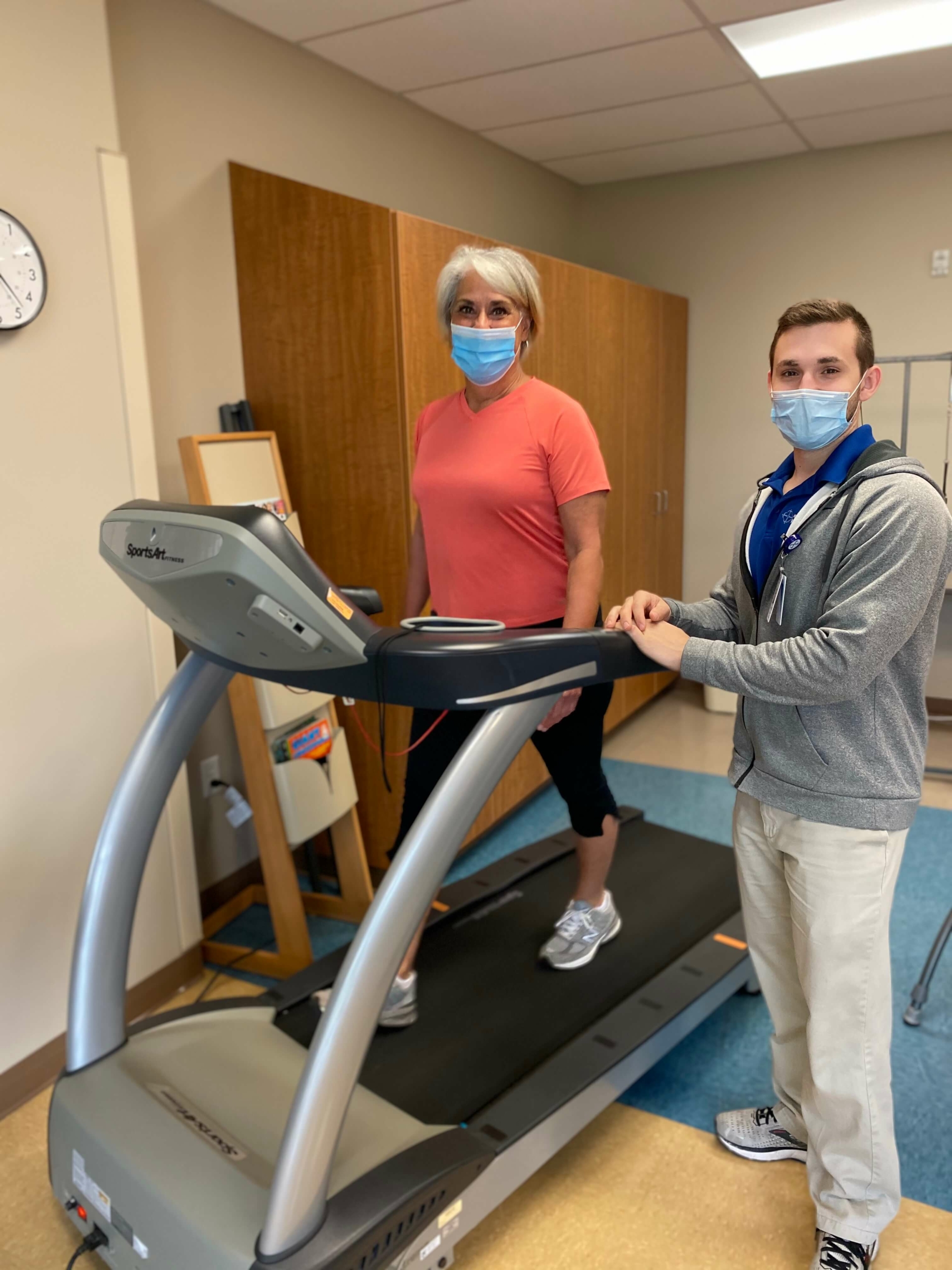
M’Liss came to NBRRH to work on her strength and endurance after experiencing severe symptoms from COVID-19.
M’Liss Brockman enjoyed a healthy and energetic lifestyle prior to being diagnosed with COVID-19 in February 2021. The 64-year-old New Braunfels’ resident has always been very active with her spouse, of 45 years, her three children and her five grandchildren.
M’Liss woke up one morning and felt abnormally tired and lethargic. Like many people, she thought it was allergies, but she and her husband decided to get tested for COVID-19 as a precaution. After receiving a positive result, M’Liss was optimistic about her recovery, but didn’t want to be too confident until she was out of the woods. Luckily, M’Liss had already received the first dose of the COVID-19 vaccine, which her family physician said, more than likely saved her life.
On day ten of her initial onset of symptoms, M’Liss had a sudden change in status and found herself unable to get out of bed. Her family physician advised her to go to the hospital where she was admitted for twelve days for respiratory failure and pneumonia due to COVID-19.
Once stabilized, M’Liss needed inpatient rehabilitation before she could safely return home. She and her husband instantly knew New Braunfels Regional Rehabilitation Hospital (NBRRH) would be the best facility to receive the care she needed to get back to her active lifestyle.
When M’Liss first started her recovery, her endurance and strength were limited, and she had trouble with her heart rate elevating with exertion. However, towards the end of her eleven day stay, she was capable of walking longer distance safely and independently.
Upon completion of her inpatient stay at NBRRH, M’Liss continued her recovery in the outpatient Post-Covid-19 program at NBRRH. The program is designed to help Covid-19 “long-haulers” who may continue to experience symptoms, such as shortness of breath, fatigue, and brain fog. Surprisingly, these patients tend to be younger and experience only a mild case of Covid-19, yet still suffer the continuing effects from the virus.
M’Liss looks forward to getting back to work and going for bicycle rides with her family. “I was able to walk with confidence after a short time thanks to the guidance and expertise of the therapists. I highly recommend New Braunfels Regional Rehabilitation Hospital for anyone focused on getting their life back.”
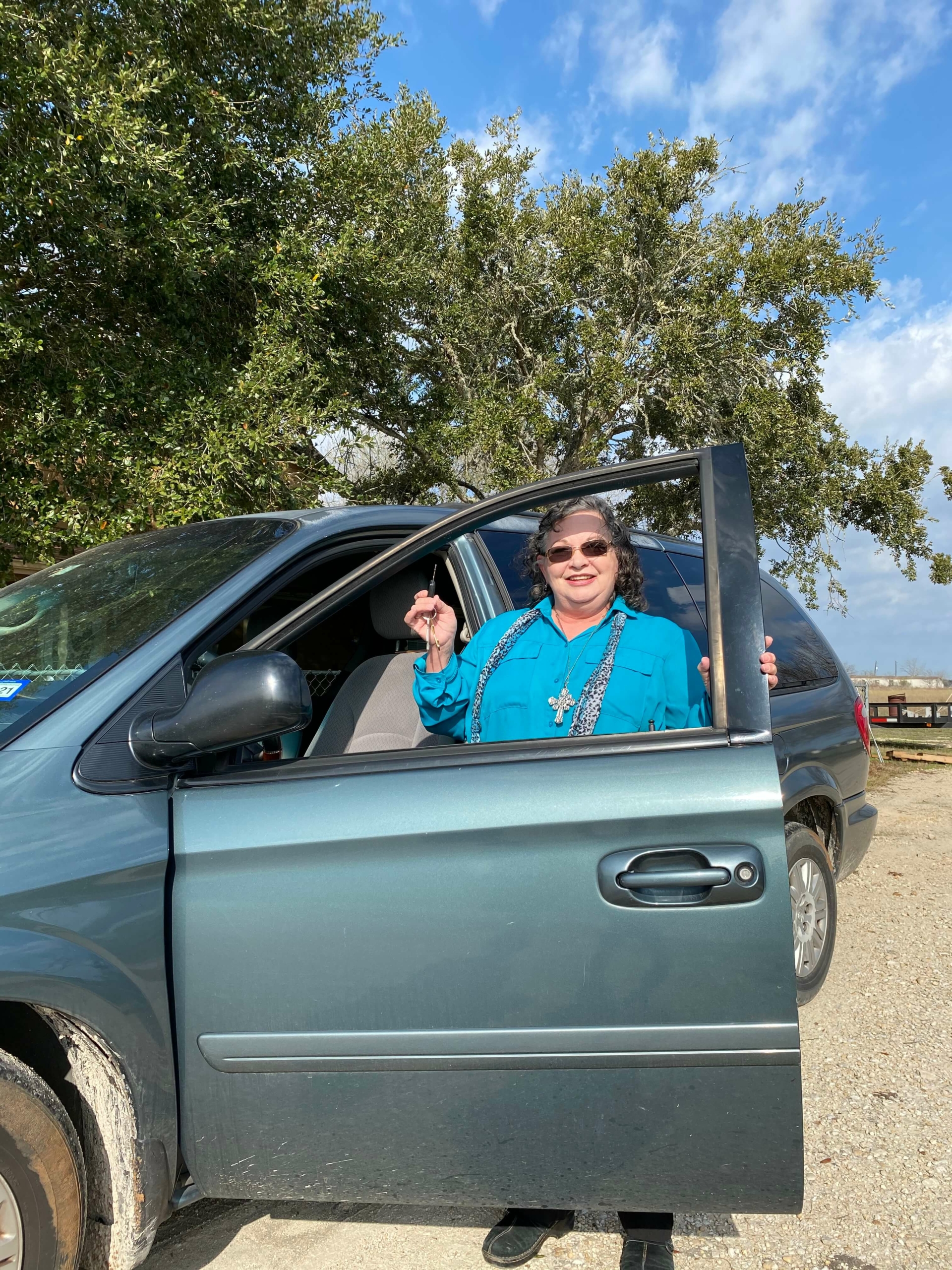
Katherine Jones, 62, was constantly on-the-go prior to having a brain bleed. She enjoyed spending time with her six grandchildren, crafting, volunteering, attending church, camping, and painting. Katherine had been dealing with a headache and blood pressure issues and noticed she began not feeling like her normal, energetic self. She saw a physician and had a CT scan done, which revealed she suffered from a subdural hematoma. Katherine was rushed to the hospital where she underwent emergency brain surgery to relieve the pressure on her brain.
Once she was stable enough to be discharged home, Katherine began outpatient therapy at New Braunfels Regional Rehabilitation Hospital. The brain bleed left her with paralysis on her left side, motor skill deficits, and cognition issues that severely limited her independence. Although she struggled with what her “new normal” would look like, she was determined to work hard in physical, occupational, and speech therapies. Katherine was empowered by the idea that she had a second chance at life and motivated to regain her strength and independence.
Katherine’s therapist asked her what her main goal was in our outpatient program. Without hesitation, she said, “I want to be able to drive again.” She was determined to be able to drive to see her grandchildren on her own and continue the volunteer work that she loved doing in her spare time.
After several months of significant improvement with outpatient therapy, the therapists felt Katherine was prepared to try the Driver Readiness Program. The program starts with a clinical assessment performed by an occupational therapist who evaluates and treats the skills needed for safe driving. This involves multiple therapy sessions involving an examination of the physical, visual, perceptual, and cognitive abilities needed for driving.
Once Katherine mastered this portion of the program, a driving rehabilitation specialist evaluated her abilities behind the wheel. This component includes hands-on training and real-world situations that a driver could encounter on the open road.
Katherine was thrilled when she passed her driving exam with the driving rehabilitation specialist—so was her family. Her husband said, “I know what the team at New Braunfels Regional Rehabilitation Hospital did for her, but what you don’t know is what the team did for me.” Katherine’s newfound independence gave her and her family peace of mind. Her daughter even felt secure with her picking up the grandkids just like old times. When speaking of the therapy team she said, “I owe them much gratitude for everything they did for me and my family to get me to the point where I’m out driving safely!”
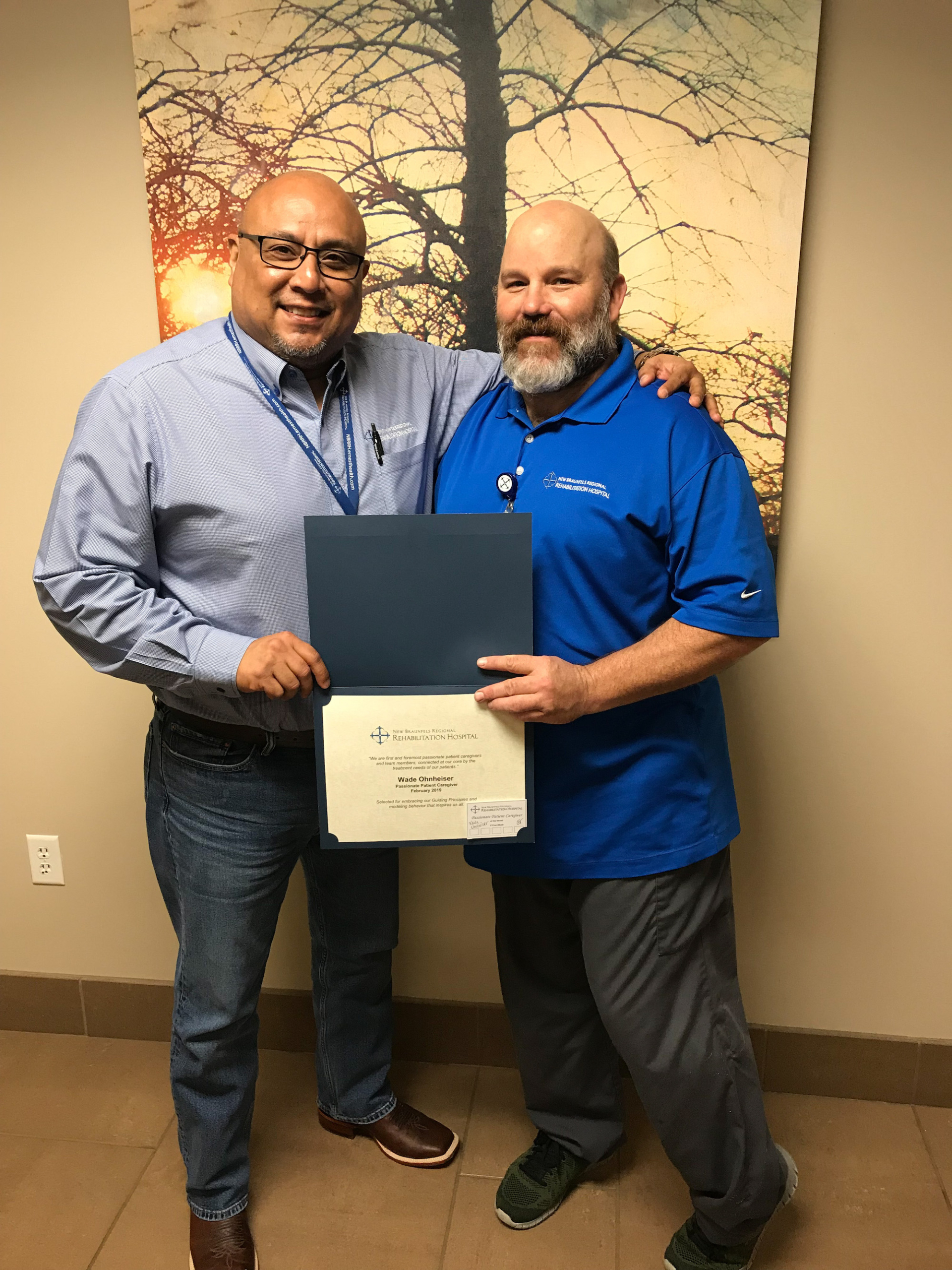
A former patient, Wade Ohnheiser joined the staff at NBRRH. He is seen here receiving the “Passionate Patient Caregiver of the Month” award for February 2019.
Wade Ohnheiser, 44, was living a busy life when he suffered a stroke that changed his life forever. Prior to his stroke, Wade worked almost 80 hours per week for an architectural millwork firm. Wade designed, built, and installed custom granite cabinetry for large businesses. Although he lived a busy life, he knew he suffered from high blood pressure. Not feeling symptomatic, Wade didn’t feel the need to take his blood pressure medication. Ultimately, that caused his stroke.
Working in the garage, Wade began to feel different. His right arm and leg would not move and he was unable to speak correctly. Wade thought he was only suffering from exhaustion. Three hours later the symptoms hadn’t subsided. Wade’s family convinced him to go to the hospital. Upon arrival, his blood pressure was 248/198 and the doctors said he suffered from a left basal pontine stroke.
Once medically stable, Wade transferred to New Braunfels Regional Rehabilitation Hospital for intense and aggressive therapy. As a result of the stroke, Wade could not walk or use his right hand. Wade was motivated to begin therapy, eager to regain the use of his right side. Wade also had difficulty with his speech, including thought patterns, word finding, and problem-solving.
Wade’s biggest motivation, though, was his 6-year-old daughter. He wanted to return home and make her school lunches again. During his stay, Wade’s daughter had a school play that he did not want to miss. This presented a great opportunity for Wade’s recovery. The therapy staff used the play as an activity which allowed Wade to practice reintegrating into the community with real-life situations he may encounter on a daily basis once he returned home.
After a few weeks at the hospital, Wade successfully discharged home, ambulating with the use of a walker. The work was not over though—Wade returned for outpatient therapy services for the next three months. He continued working on his walking. Wade also learned methods and devices to make life easier and to adjust to life’s new circumstances. Wade always gave everything he had during his therapy sessions. He said, “If you give 100% to everything, it’ll take care of itself with time.”
Time and determination is what Wade needed. He graduated from outpatient a few months later and no longer needed to use a walker to ambulate. Wade also regained the use of his hand, so he felt it was time to find a job to contribute to society and to his family. He applied for a patient care technician position at New Braunfels Regional Rehabilitation Hospital because he wanted to “become a part of the team that gave him so much.”
Today, Wade has held several positions at the facility, including patient care technician, therapy technician, and currently, maintenance mechanic. He enjoys the opportunity to bring patients joy. Wade uses his situation as an opportunity to relate to patients and give them hope that life can return to normal, even if it is a new normal.
Wade said, “My life has been a blessing and I owe it all to this facility.” His drive and determination are what made him successful not only has a patient, but now as an employee. Wade is a huge asset to the facility. He has been awarded “Passionate Patient Caregiver of the Month” numerous times and was even awarded “Passionate Patient Caregiver of the Year” in 2017.
“I’m alive and I’m grateful. Every extra day I get on Earth is a blessing, and I’m most appreciative of the opportunity to work here,” Wade said.
We are blessed to have had the opportunity to be a part of Wade’s recovery journey as well as the opportunity to work with him now on a daily basis!
At the age of 47, Mark Cook almost lost his life in a motor vehicle accident. When Mark arrived at Brooke Army Medical Center’s (BAMC) Level 1 Trauma Center he was diagnosed with a traumatic brain injury.
Mark spent ten days in a coma. Fortunately, he wouldn’t require a craniotomy to relieve the pressure in his brain. The doctors did not think he would be able to survive the surgery. But, the pressure in his brain was increasing. It seemed that was the only option. Mark’s wife of 15 years recalls yelling at him, saying, “you are not allowed to leave me!” She could not imagine life without him. They still had so many hopes, plans and dreams to accomplish together. She begged him to stay strong and fight.
Three hours later, the pressure in Mark’s brain miraculously decreased. The doctors said he would no longer need the surgery. Mark remained at BAMC for two months while he gained medical stability.
Mark and his wife knew the road to recovery was going to be a long road. Wheelchair bound, Mark had to relearn how to walk, talk, and stand. He also needed to relearn how to perform activities of daily living such as bathing, grooming, eating, dressing, and toileting. While at BAMC, Mark’s social worker connected him with the Texas Health & Human Services’ Comprehensive Rehabilitation Services program. The program assists eligible people who have suffered from a traumatic brain injury (TBI) or traumatic spinal cord injury (TSCI) to function independently in their home and community by providing funding.
Through this program, Mark admitted to a rehabilitation hospital in Austin for four months. Post-acute brain injury rehabilitation for three months followed, to aid in his transition home. Mark continued to work hard to regain his strength. To function independently in the community, Mark knew more therapy was necessary.
That led Mark to New Braunfels Regional Rehabilitation Hospital. Mark began outpatient physical therapy, occupational therapy, and speech therapy at NBRRH. On his first day, Mark unsteadily walked in using a cane. Due to his injury, Mark had trouble using his right hand. Occupational therapy worked on that aspect, as well as his activities of daily living. Additionally, Mark’s speech and cognition were impaired. Speech therapy helped him with thought processing, reasoning, and memory.
A large part of Mark’s success was due to his wife’s untiring support and encouragement. She watched him progress little by little with each therapy session. She continued to be Mark’s biggest cheerleader throughout this journey. Mark’s positive outlook on life despite his injury inspired the therapists and staff at New Braunfels Regional Rehabilitation Hospital. “Mark was always cheerful, motivated, and eager to participate in therapy,” said Sarah, Mark’s physical therapist. “He always brought a smile to our faces every time we treated him.”
Six months later, Mark continues to have a positive attitude as he graduates from our outpatient program. A year and a half after the accident, Mark now walks independently without an assistive device. His cognition, memory, and speech have improved tremendously. Rehabilitation isn’t over yet though—Mark plans to continue a home exercise program to maintain his level of independence.
Prior to his brain injury, Mark enjoyed playing the guitar and ukulele. He plans to continue playing music in the future now that he has better usage of his right arm. Mark and his wife also plan to travel throughout the United States to see and experience new adventures together.
Mark has made so much progress throughout his time with us and we look forward to seeing where his adventures will take him next!
About Ernest Health
New Braunfels Regional Rehabilitation Hospital is part of Ernest Health, a network of rehabilitation and long-term acute care hospitals. Ernest Health hospitals see patients who are often recovering from disabilities caused by injuries or illnesses, or from chronic or complex medical conditions.Read More
Quick Reference Links
• Contact Us• Career Opportunities at this Hospital
• Price Transparency
• About Ernest Health

